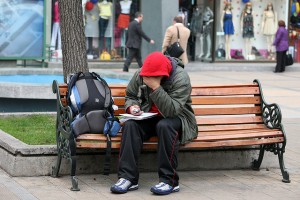1. to fail an exam/test [verb] [zakte, gezakt] [‘za-kun‘]
 Unlike its opposite “slagen“, “zakken” is mostly used with reference to the test or the exam, unless it is very clear from context.
Unlike its opposite “slagen“, “zakken” is mostly used with reference to the test or the exam, unless it is very clear from context.
(Photo: Alex Proimos (flickr.com) – some rights reserved.)
Examples:
– “Ik baal als een stekker dat ik gezakt ben voor dat examen!”
(“I’m really pissed off that I failed that exam!”)
– “Hoe vaak ben je al gezakt voor je rijexamen?”
(“How many times have you failed your driving test (already)?”)
Related words:
– “Slagen“: to pass an exam/test, to succeed.
– “Verprutsen”: to mess up.
Example:
– “Hoe ging je examen?” – “Ik weet niet, volgens mij heb ik het verprutst.”
(“How did the exam go?” – “I don’t know, I think I messed up.” Note that “verprutsen” needs the “het” to refer to the exam.)
2. to lower, to fall, to drop [verb] [zakte, gezakt] [‘za-kun‘]
Examples:
– “Een dag na de overstroming begon het waterpeil weer te zakken.”
(“One day after the flood, the water level started to drop again.”)
– ” ‘Laat je handen nu maar zakken’, zei de politieman tegen de schurk.”
(” ‘You can lower your hands now’, the policeman said to the villain.” Lit.: “Let your hands drop now…”)
– “Ik wacht nog wat langer met het kopen van een iPod, totdat deze in prijs gezakt is.”
(“I’ll wait a bit longer before I buy an iPod, until it has lowered in price.” Here one also uses the verb “dalen”.)
Expressions:
– “Daar zakt mijn broek van af”: “That really pisses me off”, usually when you are astonished by something (in a negative way). Lit.: That makes my pants fall down.
– “Door je enkels zakken”: to have one’s ankle give (way).
– “Het eten laten zakken”: to digest one’s food, to let one’s food go down.
– “Inelkaar zakken”: to collapse.
Related words:
– “Doorzakken”: to party/drink until late in the night.
– “Dalen”: to descend, to lower.
3. bags, pockets [noun; plural] [de zak, de zakken] [‘zak‘]
See also “Zakje“, for the use of the diminutive of “zak”.
Examples:
– “Haal je handen uit je zakken!”
(“Take your hands out of your pockets!”)
– “Kun jij de vuilniszak even buiten zetten?”
(“Could you take the garbage (bag) outside?” Lit.: “Can you put the garbage (bag) outside for a moment?” Note that “even” is not translated, but the present tense “Kun” is translated with the past tense “could” – instead of “can” – to achieve a similar subtlety.)
– “Wat ben jij voor een ontzettende zak dat je me dit flikt!”
(“Your such a bastard that you do this to me!” Lit.: “What kind of an appalling bag are you that you play this trick on me!” Here “zak” is derived from “klootzak”, a term of abuse, see ‘Related words’.)
Related words:
– “Klootzak”: informal synonym for “scrotum” (“kloot” is an informal synonym for “testicle”).
– “Balzak”: like “klootzak” but not used as a term of abuse.
– “Luchtzak”: air pocket/hole.
– “Zakkenroller”: pick pocket [noun].
– “Zakkenwasser”: loser, incompetent person. Lit.: bag/pocket washer.

 “Opruimen” usually involves putting away or reordering objects 🙂 Cleaning in the general sense is translated with the verb “schoonmaken” (“to make clean”).
“Opruimen” usually involves putting away or reordering objects 🙂 Cleaning in the general sense is translated with the verb “schoonmaken” (“to make clean”). Unlike its opposite “
Unlike its opposite “